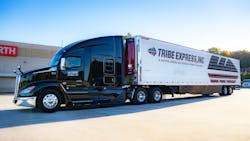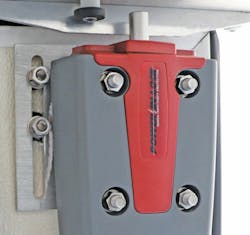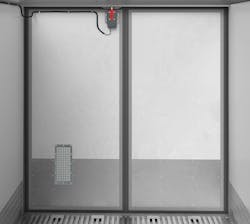Power in layers: Reefer carrier secures sensitive cargo with internal lock
Cargo theft is an accelerating problem for the transportation industry.
One expert, Travelers' Scott Cornell, recently told FleetOwner that cargo theft is at a "10-year high," pointing to a 57% year-over-year increase in activity in the second quarter of 2023—resulting in the loss of over $44 million in shipments. And it was already bad last January when pictures of looted freight trains went viral.
"The reality is, it's been like that for a long time," Kevin Lynch, QProducts & Services general manager, told Refrigerated Transporter.
"It's just starting to get some real media attention."
Matt Handte, EVP at Tribe Transportation, a refrigerated carrier in Gainesville, Georgia, is paying attention, and his view is dire. "We're seeing cargo theft numbers that are the highest we've ever seen as an industry. It's certainly out there—and it's getting worse."
Tribe hauls temperature-controlled freight, primarily consumer-care goods, and pharmaceutical ingredients—not just smartphones, clothes, and toys from Amazon—making cargo security a top priority. It's their responsibility to safeguard our food and keep life-saving drugs out of criminals' hands, not only to maintain regulatory compliance and customer confidence but also for the safety of the U.S. supply chain.
That's why Tribe added extra security to its reefer trailers—QProducts' Power In-Lock.
"For us, in this age of theft, the Food Safety [Modernization] Act, shipper seals, and external locks, the Power In-Lock gives our customers comfort knowing we have taken additional measures to prevent most issues," Handte said.
Development
The internally mounted smart lock was developed from an idea hatched by a co-owner of QProducts parent company Lanco Group, which John “Jack” Lanigan Sr., formed to house a group of companies, including Mi-Jack Products, the family’s original firm founded in 1954. As the story goes, the company leader was visiting a railyard more than 20 years ago when he saw numerous intermodal containers with open doors because their external locks were gone. Thus, he tasked Peter Mirabella and his team to develop a lock crooks couldn’t cut.
"This was a truly revolutionary idea," recalled Mirabella, now QProducts VP of technical services. "There was nothing out there in the market offering security for trailers and containers from the inside."
The first iteration of the Power In-Lock was key-based. Generation 2 traded a key for a keypad; Gen 5 consolidated the lock and control unit into one device and added Bluetooth, Wi-Fi, and new telematics connectivity, allowing users to operate the lock electronically; and Gen 6, which debuted in 2020, introduced a mobile app, easier initialization, preset configurations, and diagnostic capabilities.
"Making a dumb lock smart is what made this lock popular with the industry because of the changing demands in protecting freight, especially when transporting temperature-controlled products, to ensure no one tampers with them," Mirabella explained.
QProducts still is expanding the system. The lock currently draws power from a reefer's transport refrigeration unit (TRU), so the company is developing a solar-powered battery option for dry vans and intermodal containers.
“Technology is moving at the speed of light,” Lynch said, “so our technology team is always researching ways to advance the lock’s features and functionality, and make it better, including a more inconspicuous design that further boosts theft deterrence.”
Endorsement
The Power In-Lock's intelligent capabilities, including track-and-trace assistance, are increasingly intriguing, and the rise in cargo theft is only expanding interest, Lynch said.
"When I started getting involved with the lock [in 2015], it was a 'nice-to-have,'" he said. "And for the price it was marketed, some fleets weren't sure they could justify it. Now, if you're paying attention to anything related to cargo theft and what the regulations are for food safety and pharmaceuticals with the FDA, it's becoming a 'need-to-have.'"
J.B. Hunt specs the lock in its intermodal reefer containers. Tribe was one of the first companies to deploy the system for temperature-controlled trailers three years ago. The carrier, which runs 560 power units, now utilizes the lock in all its 920 Great Dane refrigerated trailers with Carrier Transicold TRUs.
"We wanted to add layers of security into our equipment to give customers the additional value of being able to lock a trailer from the inside to prevent pilfering and all the crazy stuff that happens on the road," Handte said.
The solution is paying off for Tribe, which also uses external trailer lockboxes.
"There have been several attempts to breach our doors through either trying to cut the lock or defeat the box, but even if they get past both of those, our trailer doors are still locked from the inside," Handte attested.
Tribe also uses the locks to track doors opening and closing for cargo security and monitoring fluctuations in temperature.
“Brands are more susceptible to negative exposure in today’s digital world, so companies moving high-value or vulnerable commodities must ensure their supply chains are secure, and their products aren’t getting into the hands of the bad guys,” Lynch said.
Deployment
Roughly 5,000 units are in active use on swing and roll-up doors today, Lynch estimated, with more than 90% spec’d in reefer vehicles. New equipment sales are down with the freight market, so demand was muted in 2023, but Lynch expects that to change. “With new designs in development and an inevitable rebound in the market, we expect more fleets to adopt the solution to combat cargo theft over the next three to five years,” he said.
Fleets and third-party installers can retrofit equipment, but it's "a challenge," Lynch added. He recommends working with OEMs to specify the lock in new builds. Tribe assisted in Gen 6 development, so its techs can easily install the locks, Handte said, but now Great Dane handles factory installation with Carrier assistance. The locks are integrated with the TRUs and Tribe's TruckMate transportation management software.
The U.S.-made devices have three default configurations: Buzzer, relock, and autolock. "Commissioning" the units is simple, using QProducts software and the mobile app, granting access to authorized users. "It will give you an audible queue when it's on and ready, and then you can connect to it via the app with Bluetooth and send encrypted open and close commands," said Tony Dellumo, QProducts marketing manager.
Mirabella said the connection security is custom-built, making it "almost impossible" to crack. Additionally, app users need authenticated credentials and assigned authority to access a particular vehicle or group of vehicles, Lynch said. Physical security is backed by multiple certification bodies and U.S. patents.
Handte said he tested the locks down to minus-60 degrees Fahrenheit.“Trailers and containers take a beating out there on the road," Dellumo said.“The Power In-Lock can withstand it.”
With a Gen 7 update in the works, it's only set to improve, too. Possible upgrades include more adaptable installation and new sensor integrations, Mirabella said. “The equipment coming out now is lighter, so we need to accommodate it to ensure we're securing new containers as well as any we've done in the past.”
About the Author

Jason McDaniel
Jason McDaniel, based in the Houston TX area, has nearly 20 years of experience as a journalist. He spent 15 writing and editing for daily newspapers, including the Houston Chronicle, and began covering the commercial vehicle industry in 2018. He was named editor of Bulk Transporter and Refrigerated Transporter magazines in July 2020.


